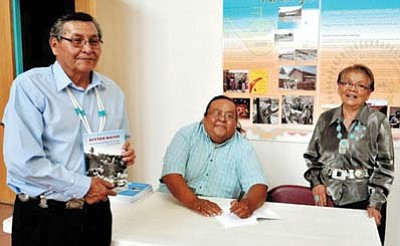Local author tackles Navajo-Hopi land dispute
FLAGSTAFF Ariz, - Navajo Malcom D. Benally recently published the book Bitter Water: Diné Oral Histories of the Navajo-Hopi Land Dispute.
The book tells the story of some of the women who resisted the 1974 Navajo-Hopi Land Settlement that created an artificial boundary, dividing in half 1.8 million acres of jointly owned Navajo-Hopi land, and was going to force 10-15,000 Navajos off their land.
"Bitter water, the book and translations, are an oral history," said Benally. "It began as a fifteen minute documentary that we were working on from about 1992 to 1998. We actively filmed the lives of women who were protesting at that time the relocation law 93-531. These women ranged in age from 70 to 109."
The book is a selection of the women's testimonies, translated from the Navajo to English language. Benally studied Navajo and English languages at Northern Arizona University. His appreciation of both languages coalesced in this book.
"The remarkable thing about the women was that they only spoke Navajo," said Benally. "And that's why I interviewed them in Navajo, in their homes, and at the time because of the stress levels they were facing. When I interviewed them it was a respite from their travels, and they were able to provide monologues that really allowed them to speak from their heart, and the book is a document of that time in the life."
Throughout Benally's studies of both languages he began to notice a pattern in the books he was studying and reading, that women were not strong figures.
"As a student I studied English and a lot of literature I came across it seems like women have always been subjugated to a more silent voice," said Benally. "And having women speaking in the first person was something that really needed to happen not only for Navajo nation but on a global scale."
This book gives these very prominent women a chance to tell their story, and through these women's tales, it gives the Navajo people a voice as well.
"The traditional element of the Navajo society is that they see themselves as caretakers of the land," said Benally. "But also, at the same time, they see themselves as children who are born of the earth and I've never heard that from anywhere else. And a lot of the changes that the Navajo people have gone through in the past 30 years, a lot of it dealing with relocation and assimilation, is very important for people at this time."
This book offers readers the opportunity to see a different side of a dispute that was very important to who the Navajo people are, and how far they have come.
"I hope that they [the Navajo] see that besides the really hard issues is that the women had to deal with, the story really is about nature," said Benally. "When people began to really review All Quiet on the Western Front back in the 30s about the World War, a lot of the people who read the literature closely realized that it was really about nature. I hope this book does the same thing, that whatever these women went through is really about nature and, how important that is in their lives."
On Aug. 20 at 2 p.m. Benally will be reading from and discussing his new book at the Museum of Northern Arizona. The event will also feature a short screening of some of the filmed personal testimonies that was the groundwork for the book.
SUBMIT FEEDBACK
Click Below to:




